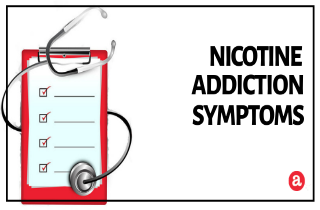Know someone who may be addicted to nicotine?
Millions of people are addicted to nicotine all around the world, subject to its addictive properties and stimulant. In fact, nicotine is one of the most commonly used addictive drugs in the United States, and accounts for over 90% of lung cancer cases. About 40,000 deaths per year are attributed to secondhand smoke alone, and smoking is also a major cause of strokes.
Here, we will review the symptoms of nicotine addiction, which are not restricted to side effects of nicotine withdrawal. Plus, we’ll let you know a little about how to treat nicotine addiction with the help of medical recovery programs. And what you can do to help someone whose life is affected by it. Then, we invite your questions or comments about nicotine addiction at the end. We try to respond to all comments with a personal and prompt reply.
Symptoms of nicotine addiction
Most people who smoke become addicted to nicotine because of its slightly euphoric and sedative effects. Someone who is addicted to nicotine may go out their way to get nicotine, always crave nicotine, have difficulty when attempting to stop smoking, and have nicotine withdrawal symptoms when they try to do so. Often someone who is addicted to nicotine will become irritated easily if they do not have nicotine or cannot get any. Another sign of nicotine addiction is when someone finds it hard to concentrate when they do not have nicotine in their system. If someone smokes half a pack of cigarettes or more per day, that could be a sign that their nicotine tolerance is high and they are also addicted.
Withdrawal symptoms are also things to look out for. Nicotine withdrawal usually has effects such as an onset of depression, increased anxiety, inability to concentrate, restlessness, and a bigger appetite. The DSM (Diagnostic and Statistical Manual of Mental Disorders) clinical criteria for nicotine addiction include:
- Continuous use of nicotine despite knowing you have medical problems related to nicotine use.
- Development of nicotine tolerance (side effects such as nausea and dizziness from smoking are no longer apparent and you need more nicotine to achieve effect).
- Spending a lot of time obtaining nicotine.
- Taking nicotine in larger amounts than you intend.
- You experience withdrawal symptoms when you stop using nicotine.
- You have given up recreational activity(ies) because of nicotine use.
- You have made unsuccessful efforts to cut down or stop nicotine use.
Nicotine addiction symptoms: Can they be treated?
Nicotine addiction symptoms can be treated through several different programs and prescription medications. Treatments for nicotine addiction symptoms include:
Nicotine addiction support groups – Addiction support groups can be helpful for helping someone treat nicotine addiction symptoms, as they usually include ex-users who have experienced nicotine addiction symptoms before. These support groups can provide insights, and tools to help nicotine addicts address psychological symptoms of nicotine addiction. These services can be found by contacting your local rehab facility or your doctor. You can also contact the American Cancer Society’s quitline at 1-800-227-2345 for additional information and help.
Nicotine replacement therapy – Nicotine replacement therapy is administration of lower doses of nicotine to help ease the symptoms of nicotine addiction. Replacement therapy can help reduce the cravings for nicotine, and does not contain any toxic chemicals that are found in smoke.
Prescription medications for nicotine addiction – Medications for nicotine addiction are available. Bupropion is a pill that will help decrease the craving for nicotine as a result of withdrawal symptoms. Varenicline is another prescription medication used for nicotine addiction treatment that helps reduce cravings for nicotine and withdrawal symptoms. These medications are not habit forming and do not contain nicotine. Contact your doctor for more information.
Signs and symptoms of nicotine addiction questions
We welcome your questions below about the signs and symptoms of nicotine addiction and treatment for nicotine withdrawal. We will try to answer any questions related to the topic promptly.









Related Posts